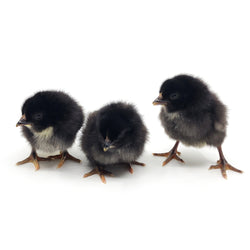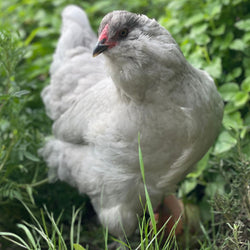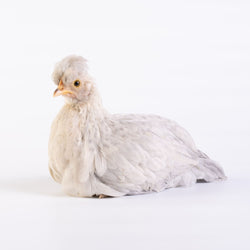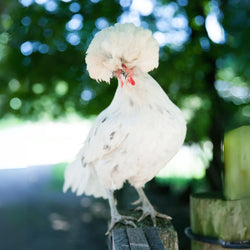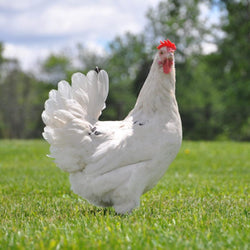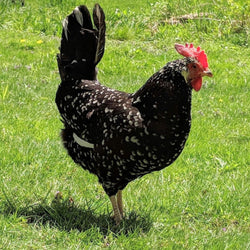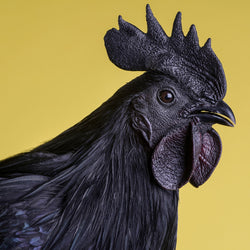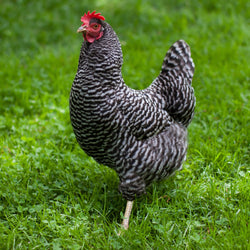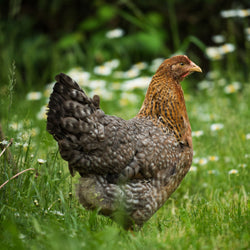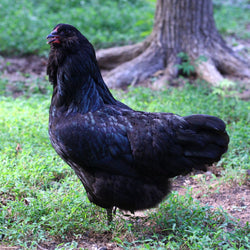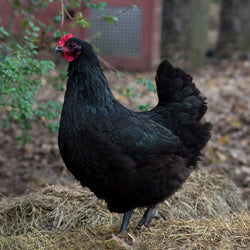page=2/--
Frequently Asked Questions
Here we answer the most commonly-asked questions about ordering, chicken care, and more.
What is this black spot or thin string attached to my baby chick's rear end?
It's your chick's umbilical cord, and if you notice, that black, scabby spot or string will be below your check's vent or "pooper." Be SURE not to confuse this with pasting, which occurs on the vent, not below it. Usually the umbilical cord falls off immediately during hatching, but sometimes it can hang around for a few days (or it falls off but the belly button takes a while to heal, leaving a scabby spot). This can happen whether you hatch at home, or if you order from My Pet Chicken or another hatchery. Please don't try to remove it,...
Read MoreThere is a black spot on my chicken's face! Should I be worried?
When a chicken gets a peck or a scrape on a comb or face, this will manifest as a black spot or scab, and isn't usually a cause for concern. If ALL of your chickens seem to have spots, if they are yellow or pussy, or if you are sure the spots you see are not from a scrape or peck, it might be a different problem. One possibility is that your chickens have Fowl Pox (dry) or Fowl Pox (wet). There are a few different things that can cause lesions, however, and if you have any concern, we recommend you take...
Read MoreHow do I care for a wounded chicken?
It's so stressful to have a hurt chicken! If you've got an emergency, or a wound situation you don't feel equipped to handle, try our friends at VetTriage. They are open 24/7/365 and are ready to provide tele-health services for your chicken or any other bird for a reasonable fee. (This hen was attacked but made a beautiful recovery) That said, you may be equipped to handle the wound by yourself. Here's how we recommend you go about doing it. Step-by-step instructions for treating a wounded chicken Separate your wounded chicken from the rest of the flock first, otherwise the...
Read MoreShould I give my chicks medicated feed or unmedicated feed?
Medicated feed is formulated for chicks to help them combat coccidiosis, a disease that is found just about everywhere in the environment. Most medicated starter feeds contain the medication amprollium. Amprollium does not *treat* coccidiosis, but it helps the babies fight off cocci oocysts while they develop their own immunity. It is a preventative. If your birds have been vaccinated against coccidiosis, feeding them medicated feed will nullify the coccidiosis vaccination, although it will not hurt them. (We do not offer the coccidiosis vaccine, as it is too stressful on the birds--we offer the Marek's vaccine, which is not affected...
Read MoreDo I need to give my shipped chicks vitamins and electrolytes when they arrive?
We don't generally think it is a good idea to offer anything but plain, clean water unless your chicks are exceedingly stressed. When chicks are put into their brooder for the first time after shipping, they are understandably thirsty and will sometimes drink more and recover faster if their water is fresh and tastes good. If you have much experience medicating animals, you probably know that medicating animals via drinking water is convenient, but can be problematic. If it is hot, and they drink too much and increase the dose they are getting, sometimes getting too much! On the other...
Read MoreDo you offer vaccinations for bantams?
Guess what? Now we do! For over a decade we didn't because we felt the bantams were too tiny to withstand the vaccine, but the equipment has improved! We're happy to announce that starting in 2021, all chicks we sell are able to be vaccinated for Marek's disease.
Read MoreWhat are the signs of mites or lice and how do I treat my birds if they have an infestation?
Mites and lice are a common problem for chickens and can be carried in by wild birds, so keep that in mind. That means that if you have an infestation, it doesn't necessarily mean your management practices are bad. Don't get overwhelmed by guilt! There are some things that you just can't control...and birds landing in your trees or walking in your yard is probably one of them. Signs of parasite infestation in your flock's feathers Mites inhabit your birds' feathers and suck their blood: they're like fleas, lice, or mosquitoes that live in your hair---yuck! Infestations of feather mites...
Read MoreMy chicken has a lump or tumor on her chest--what should I do?
You are probably seeing your chicken's crop. A chicken's crop is a part of her digestive system, and is located on her breast. You can see it in the illustration below, closest to the front. When it fills up with food, it may stick out a little bit. It will be smaller in the morning before she has eaten, and larger after she is full. The crop (or "craw") holds food before it goes further down their digestive tract. Chickens basically store food in their crops; it is like a chicken lunchbox. Then it moves into the stomach or proventriculus...
Read More







"The Clubhouse" Coop
Easy to assemble and built to last, the Clubhouse Coop is the perfect starter coop for a small flock.
